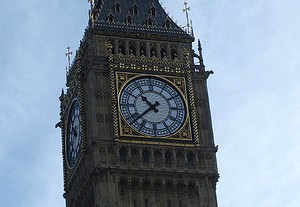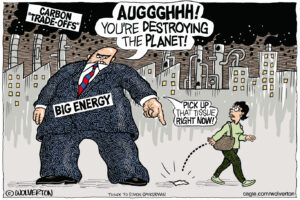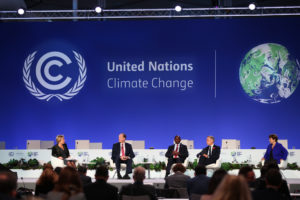Climate Chaos ‘Needn’t Happen—If …’
Two reports suggest that it may be possible to avoid serious climate change, or even to reverse it. But both come with key qualifications -- conditions that will have to be met if they are to prove correct.
By Alex Kirby, Climate News NetworkThis piece first appeared at Climate News Network.
LONDON — Two separate groups of researchers say there are grounds for hope that the world can escape the prospect of a possibly uncontrollable and very damaging level of climate change. But they agree that world governments will have to meet rigorous conditions to make this happen.
The first study, published in the journal Environmental Research Letters, is by a team from Chalmers University of Technology in Sweden. It makes the bold claim that ambitious temperature targets “can be exceeded then reclaimed” by around mid-century.
The way to achieve this, the study says, is by combining bio-energy with carbon capture and storage – a marriage of technologies it calls BECCS. This, it says, “can reverse the global warming trend and push temperatures back below the global target of 2°C above pre-industrial levels, even if current policies fail and we initially overshoot this target”.
If BECCS is used on a sufficiently large scale, the team says, along with other renewable energy sources, then “temperature increases can be as low as 1.5°C by 2150?.
The study says stringent temperature targets can be met at significantly lower costs if BECCS is implemented 30 to 50 years hence, though this may mean a temporary overshoot of the 2°C target.
One of the study’s co-authors, Professor Christian Azar, said reversing the warming trend “requires both large-scale use of BECCS and reducing other emissions to near-zero levels using other renewables – mainly solar energy or nuclear power”.
But the authors say their study is not an argument for delay. Professor Azar says: “BECCS can only reverse global warming if we have net negative emissions from the entire global energy system. This means that all other CO2 emissions need to be reduced to nearly zero.
“Also, temperatures can only be reduced by about 0.6°C per century, which is too slow to act as an ‘emergency brake’ if climate damages turn out to be too high.”
However many and serious the provisos and qualifications the study makes, it does strike a hopeful note, one which is echoed by the second study, from the publishers of the original Hartwell paper, co-ordinated at the London School of Economics (LSE) and published in 2010.
This new Hartwell paper is entitled The Vital Spark: innovating clean and affordable energy for all, and its tone is set by a question posed by the Hartwell group convenor, LSE emeritus research Professor Gwythian Prins, one of the authors of The Vital Spark,
He writes in the study: “Only general prosperity can produce widespread consent for emissions reductions, and only affordable energy for all can deliver prosperity.” So how can the world square that circle?
The study’s international team of 20 authors propose 11 building blocks which they say are the necessary conditions for success in the energy transition that humanity needs. “Some may be tough for today’s policy-makers to accept”, they say, arguing that all are essential.
They argue that only a high-energy planet is morally defensible or politically viable. But at present, they say, only carbon-intensive sources of energy offer a realistic prospect of this, with obvious hazards to the climate.
Asked by the Climate News Network whether he thought the obstacles to providing affordable energy for all were technical or human, Professor Prins replied: “Asymetrically the latter.
“The lessons of the last 15-20 years have seen the failure of attempt sat driven transitions, when you try to cause a change in an energy regime by policy, a fragile and unpredictable tool. We need humility and pragmatism.
“For example, shale gas has tremendously positive environmental implications, so long as you regard it as a bridge, not a destination.
Professor Prins says: “It is simply not acceptable to pursue policies that will leave the bottom billion of humanity without the energy services they require for wellbeing and dignity.
“This paper attempts to form a common foundation which will enable us to provide large quantities of energy at low cost, and with low environmental impact.
Your support matters…Independent journalism is under threat and overshadowed by heavily funded mainstream media.
You can help level the playing field. Become a member.
Your tax-deductible contribution keeps us digging beneath the headlines to give you thought-provoking, investigative reporting and analysis that unearths what's really happening- without compromise.
Give today to support our courageous, independent journalists.






You need to be a supporter to comment.
There are currently no responses to this article.
Be the first to respond.